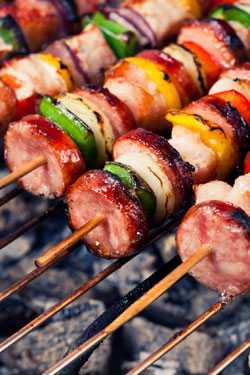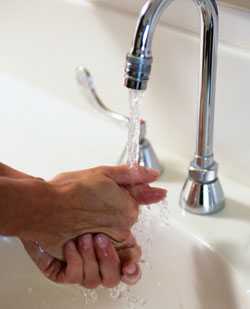Food Safety at Fairs and Festivals
 A fun summer activity is attending fairs, festivals, carnivals, and rodeos. Follow these tips to have a safe cooking, eating, and drinking experience at those events.
A fun summer activity is attending fairs, festivals, carnivals, and rodeos. Follow these tips to have a safe cooking, eating, and drinking experience at those events.
A big part of summer for many people is attending fairs and festivals. There are always fun things to see and experience, including art work, music, games, and rides. One of the biggest draws to these events is the many different types of foods and drinks available.
Foodborne illnesses increase during the summer months, making it even more important to follow food safety steps. There are several reasons that foodborne illnesses increase in summer; one is that people are cooking and eating outside more often. Sometimes the usual safety controls that a kitchen provides, like monitoring of food temperatures, refrigeration, workers trained in food safety and washing facilities, may not be available when cooking and dining at fairs and festivals.
Remember that food safety practices should be the same at fairs as they are at restaurants and at home: Clean, Separate, Cook, and Chill. Learn more about these steps here, and reduce the chance you’ll get a foodborne illness this summer.

Learn how to avoid foodborne illness at fairs and festivals.

Foodborne illnesses increase during the summer months.

Wash your hands often.
Consumers
What should you consider before buying food from a vendor?
- Does the vendor have a clean/tidy workstation?
- Does the vendor have a sink for employees to wash their hands?
- Do the employees wear gloves or use tongs when handling food?
- Does the vendor have refrigeration on site for raw ingredients or pre-cooked foods?
- Has the vendor been inspected? Is a recent inspection report available? Requirements vary by state, but in general temporary and mobile vendors, like those at fairs and carnivals, should have a license to sell food and beverages in a particular state or county for a specific time period. You can check with the local health department to see if the vendors are licensed and if a food inspection has been completed.
Are there healthy food alternatives to consider at fairs and festivals?
When purchasing food from a vendor, look for healthy options first. If they are not available, consider bringing your own food to save money and calories. Bringing food from home allows you to eat a healthy meal or snack as a family, while still enjoying the festive atmosphere around you. Don't forget to keep safe food storage practices in mind. Always remember to keep cold foods cold and hot foods hot.
If bringing food from home, what are proper food handling and storage practices?
If you bring food to a fair or festival from home, be sure to keep food handling and storage times in mind. Don't let food sit out for more than two hours. On a hot day (90°F or higher), reduce this time to one hour. Be sure to put perishable items in a cooler or insulated bag.
What steps can you take to protect you and your family?
Wash Hands Often:
- Find out where hand washing stations are located.
- Always wash your hands right after petting animals, touching the animal enclosure, and exiting animal areas – even if you did not touch an animal.
- Always wash hands after using the restroom, after playing a game or going on a ride, before eating and drinking, before preparing food or drinks, after changing diapers, and after removing soiled clothes or shoes.
- Bring hand sanitizers or disposable wipes in case there aren't any places to wash your hands.
- Wash your hands with soap and clean running water for at least 20 seconds. Directions for washing hands can be found here.
Report Illness:
Anytime you think you may have gotten a foodborne illness, report it to your local health department, even if you have already recovered. The local public health department is an important part of the food safety system. Often, calls from concerned citizens are how outbreaks are first detected. If a public health official contacts you to find out more about an illness you had, your help is important. Information from healthy people can be just as important as information from sick people in public health investigations. Your help may be needed even if you are not sick.
Food Vendors, Community Organizations, and Fair Organizers
Requirements differ by state, but in general temporary and mobile food vendors should apply for a food license with the fair's state or county health department. Many community-based organizations set up booths to sell various foods at local festivals and fairs too. There are special exceptions, but it is better to be safe than sorry—get a license! Contact information for local and state health departments can be found here.
Fair organizers should try to include a person trained in food safety throughout the planning process, as well as have them present at the fair.
It is important that food safety steps are followed so the food served doesn't make anyone sick. Try to limit the amount of food preparation preformed off-site, a practice known as cook-serve. Also follow the four basic food safety steps: CLEAN, SEPARATE, COOK, and CHILL.
Now you're on your way to a safe and healthy summer!
- Page last reviewed: June 22, 2016
- Page last updated: June 22, 2016
- Content source:
Error processing SSI file


 ShareCompartir
ShareCompartir